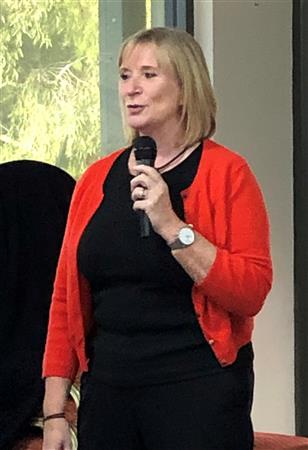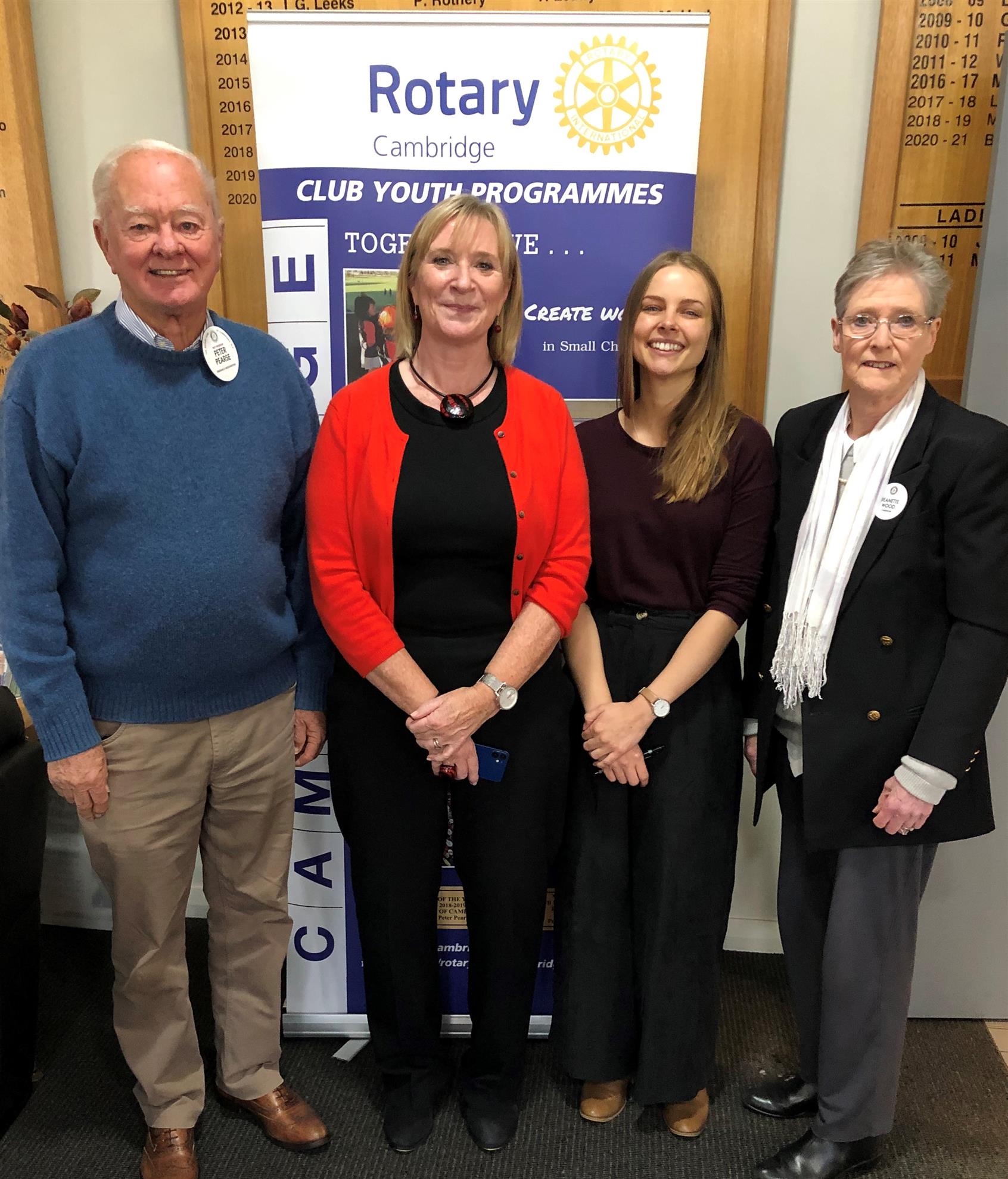
 Assoc. Prof. Mel Ferguson and Audiologist Ellen Bothe from the Ear Science Institute came to address us on ‘Learning to Listen’, and Mel started by emphasising that knowledge of hearing loss must be disseminated throughout the community if we are to make progress in tackling the issue. Hearing loss ranges from mild to profound and it makes participation in groups very difficult, resulting in impaired social engagement and withdrawal due to lack of communication. Hearing loss not only affects the individual but also their circle of family and friends. It worsens with age, and by 70 years old individuals have a 70% chance of getting hearing difficulties. One in six people in Australia have hearing loss, and only 1 in 3 people who need a hearing aid actually have one. Mel referred us to the C2Hear website designed to help people with information about hearing aids which, over the last ten years or so, have become very sophisticated. On average people wait 9 years before they get a hearing aid, and Mel urged us to see an Audiologist sooner rather than later. She also recommended aids with smart phone connectivity. Ellen then explored the possible link between hearing loss in middle age and dementia, and concluded that it is a likely factor because reduced stimulation diminishes cognitive resources. Conversely, hearing aids probably improve brain health through stimulation. Hearing loss victims often say “I can hear but I can’t understand” and Ellen told us about auditory-cognitive training (ACT) which teaches the brain to listen and is thought to minimise age-related sensory and cognitive decline. ACT seems to have a positive effect on auditory perception, memory, attention, and speed of processing. The talks were most relevant to our Members and many Guests – thank you Ladies!
Assoc. Prof. Mel Ferguson and Audiologist Ellen Bothe from the Ear Science Institute came to address us on ‘Learning to Listen’, and Mel started by emphasising that knowledge of hearing loss must be disseminated throughout the community if we are to make progress in tackling the issue. Hearing loss ranges from mild to profound and it makes participation in groups very difficult, resulting in impaired social engagement and withdrawal due to lack of communication. Hearing loss not only affects the individual but also their circle of family and friends. It worsens with age, and by 70 years old individuals have a 70% chance of getting hearing difficulties. One in six people in Australia have hearing loss, and only 1 in 3 people who need a hearing aid actually have one. Mel referred us to the C2Hear website designed to help people with information about hearing aids which, over the last ten years or so, have become very sophisticated. On average people wait 9 years before they get a hearing aid, and Mel urged us to see an Audiologist sooner rather than later. She also recommended aids with smart phone connectivity. Ellen then explored the possible link between hearing loss in middle age and dementia, and concluded that it is a likely factor because reduced stimulation diminishes cognitive resources. Conversely, hearing aids probably improve brain health through stimulation. Hearing loss victims often say “I can hear but I can’t understand” and Ellen told us about auditory-cognitive training (ACT) which teaches the brain to listen and is thought to minimise age-related sensory and cognitive decline. ACT seems to have a positive effect on auditory perception, memory, attention, and speed of processing. The talks were most relevant to our Members and many Guests – thank you Ladies!

 Assoc. Prof. Mel Ferguson and Audiologist Ellen Bothe from the Ear Science Institute came to address us on ‘Learning to Listen’, and Mel started by emphasising that knowledge of hearing loss must be disseminated throughout the community if we are to make progress in tackling the issue. Hearing loss ranges from mild to profound and it makes participation in groups very difficult, resulting in impaired social engagement and withdrawal due to lack of communication. Hearing loss not only affects the individual but also their circle of family and friends. It worsens with age, and by 70 years old individuals have a 70% chance of getting hearing difficulties. One in six people in Australia have hearing loss, and only 1 in 3 people who need a hearing aid actually have one. Mel referred us to the C2Hear website designed to help people with information about hearing aids which, over the last ten years or so, have become very sophisticated. On average people wait 9 years before they get a hearing aid, and Mel urged us to see an Audiologist sooner rather than later. She also recommended aids with smart phone connectivity. Ellen then explored the possible link between hearing loss in middle age and dementia, and concluded that it is a likely factor because reduced stimulation diminishes cognitive resources. Conversely, hearing aids probably improve brain health through stimulation. Hearing loss victims often say “I can hear but I can’t understand” and Ellen told us about auditory-cognitive training (ACT) which teaches the brain to listen and is thought to minimise age-related sensory and cognitive decline. ACT seems to have a positive effect on auditory perception, memory, attention, and speed of processing. The talks were most relevant to our Members and many Guests – thank you Ladies!
Assoc. Prof. Mel Ferguson and Audiologist Ellen Bothe from the Ear Science Institute came to address us on ‘Learning to Listen’, and Mel started by emphasising that knowledge of hearing loss must be disseminated throughout the community if we are to make progress in tackling the issue. Hearing loss ranges from mild to profound and it makes participation in groups very difficult, resulting in impaired social engagement and withdrawal due to lack of communication. Hearing loss not only affects the individual but also their circle of family and friends. It worsens with age, and by 70 years old individuals have a 70% chance of getting hearing difficulties. One in six people in Australia have hearing loss, and only 1 in 3 people who need a hearing aid actually have one. Mel referred us to the C2Hear website designed to help people with information about hearing aids which, over the last ten years or so, have become very sophisticated. On average people wait 9 years before they get a hearing aid, and Mel urged us to see an Audiologist sooner rather than later. She also recommended aids with smart phone connectivity. Ellen then explored the possible link between hearing loss in middle age and dementia, and concluded that it is a likely factor because reduced stimulation diminishes cognitive resources. Conversely, hearing aids probably improve brain health through stimulation. Hearing loss victims often say “I can hear but I can’t understand” and Ellen told us about auditory-cognitive training (ACT) which teaches the brain to listen and is thought to minimise age-related sensory and cognitive decline. ACT seems to have a positive effect on auditory perception, memory, attention, and speed of processing. The talks were most relevant to our Members and many Guests – thank you Ladies!